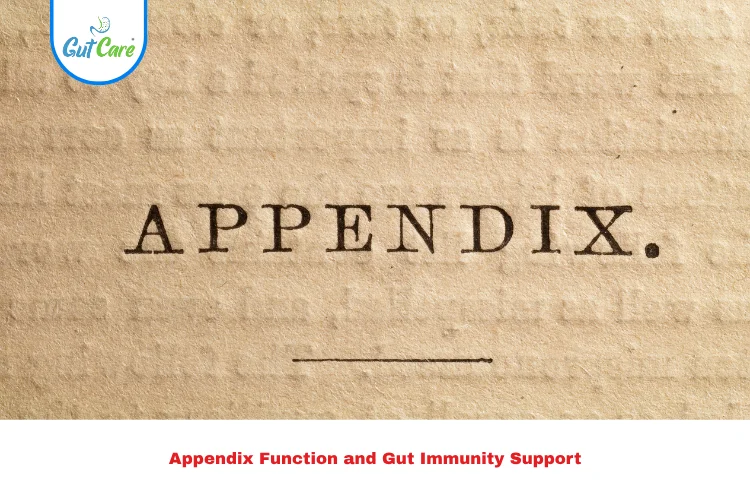The appendix function is often misunderstood as a vestigial organ, yet it plays a crucial role in maintaining gut immunity. Understanding Appendix Function helps in recognizing early signs of complications and promotes better digestive health. At Gutcare Clinics, Bangalore, Dr. Yuvrajsingh Gehlot, an experienced colorectal surgeon, provides expert diagnosis and treatment for all appendix-related concerns, ensuring personalized and safe care.
Understanding Appendix Function
The appendix is a small, tube-shaped pouch attached to the beginning of the large intestine, located in the lower right side of the abdomen. For a long time, it was considered a useless organ, but modern research shows that the appendix plays an important role in supporting gut health and immunity.
One key appendix function is to store beneficial bacteria that help maintain a healthy balance in the digestive system. After a stomach infection or illness, these good bacteria can repopulate the intestines, helping the body recover faster. The appendix also contains immune tissue that assists in protecting the body from harmful germs.
Understanding how the appendix works helps people recognize why keeping it healthy matters. When the appendix becomes blocked or inflamed, it may lead to discomfort or infection that requires medical care.
Key Points on Appendix Function:
- Acts as a safe house for good gut bacteria.
- Supports immune responses in the intestines.
- Helps prevent certain infections and maintain digestive balance.
Recognizing Appendix Symptoms
Being aware of appendix pain symptoms helps in timely medical intervention. Symptoms may vary between men and women. For instance, appendix symptoms in female patients can sometimes mimic gynecological issues, making diagnosis more challenging.
Common Symptoms Include:
- Sharp pain in the lower right abdomen.
- Nausea, vomiting, or loss of appetite.
- Swelling or tenderness in the abdomen.
- Fever and general discomfort.
Early recognition of appendix symptoms is crucial for timely treatment. Understanding the Appendix Function helps in identifying issues and ensuring proper gut health.
Why Appendix Problems Happen
The appendix can sometimes develop issues, most commonly when it becomes inflamed or blocked. This happens due to a variety of factors that interfere with normal function and can cause discomfort in the lower right abdomen. Understanding the reasons behind appendix problems and the Appendix Function can help in early detection and timely treatment.
Several factors can affect the appendix, leading to inflammation or infection. Understanding why appendix happen is essential for early detection and treatment..
Causes and Risk Factors of Appendix Problems
The appendix is a small pouch attached to the large intestine. While its exact role is still being studied, the Appendix Function is known to support gut immunity. When the appendix becomes blocked or inflamed, it can lead to appendicitis, a condition that requires timely medical attention. Understanding the causes and risk factors helps in early detection and prevention.
Common Causes
- Blockage in the appendix opening: This is often due to hardened stool, mucus buildup, or swollen tissue blocking the passage.
- Infection: Bacterial or viral infections in the digestive tract can cause inflammation that spreads to the appendix.
- Enlarged lymphoid tissue: The lymph nodes near the appendix may swell due to infection, blocking normal flow.
- Foreign bodies: Occasionally, small particles or parasites can obstruct the appendix.
- Genetic factors: Family history may increase the likelihood of appendix inflammation.
Risk Factors
- Age: Appendix problems are more common in younger individuals but can occur at any age.
- Digestive issues: Ongoing bowel problems or infections may increase inflammation risk.
- Low-fiber diet: Lack of fiber can lead to constipation, which may contribute to appendix blockage.
- Family history: If close relatives have had appendix-related issues, the risk can be slightly higher.
- Infections: Recent gastrointestinal infections can trigger inflammation around the appendix area.
Appendix Treatment Options
Treatment depends on the severity of the condition. At Gutcare Clinics, Dr. Gehlot provides tailored treatment plans for patients:
- Observation: For mild or early-stage issues, careful monitoring may be sufficient.
- Medications: Pain management and antibiotics for infections.
- Surgical Intervention (Appendectomy): The most common treatment for inflamed or infected appendix, often performed using minimally invasive techniques.
Prompt medical care helps reduce complications like rupture or widespread infection.
Preventing Appendix Problems
While some factors like genetic predisposition cannot be changed, maintaining overall digestive health helps prevent complications:
- Eat a fiber-rich diet to avoid constipation.
- Stay hydrated to support digestive function.
- Monitor abdominal discomfort and seek prompt care if symptoms appear.
Conclusion
The appendix function plays an important role in gut immunity and digestive balance. Recognizing early symptoms and understanding the causes ensures timely intervention. At Gutcare Clinics, Bangalore, Dr. Yuvrajsingh Gehlot offers expert evaluation and safe treatment options. Early consultation is key to protecting your digestive health and ensuring lasting relief.
FAQs
1. What is the main function of the appendix?
The appendix serves as a reservoir for beneficial gut bacteria, supporting immune health and digestive balance.
2. What are common appendix pain symptoms?
Pain in the lower right abdomen, nausea, swelling, and fever are common signs.
3. Why appendix problems happen?
Appendix problems can occur due to blockages, infections, or inflammation of surrounding tissues.
4. How is appendix treated?
Treatment ranges from observation and medications to surgical removal, depending on severity.
5. How does Gutcare Clinics help with appendix care?
At Gutcare Clinics, Bangalore, Dr. Yuvrajsingh Gehlot provides expert diagnosis, minimally invasive surgery, and personalized treatment plans.




